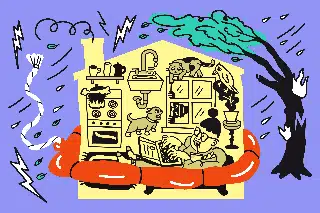Why Do We Need Renters Insurance if We Never Leave the House Anymore?

As the pandemic drags into its seventh month, you may be growing real tired of your surroundings. Working from home is officially not fun anymore. You're agitated, and probably asking yourself, "Why am I even paying for renters insurance? It's not like I'm going anywhere, so I'm not at risk of coming back at 5 p.m. and finding my apartment in ruins a la the Baudelaire kids from A Series of Unfortunate Events."
Unfortunately, experts say, that's not how renters insurance works.
“Everyone’s typical schedule has been thrown for a lurch, but renters insurance doesn’t really change based on whether you’re having guests over or are out on the town,” according to Yael Wissner-Levy, VP of communications at Lemonade.
What gives?
Wissner-Levy says both homeowners and renters insurance are contracts that cover your property and belongings in case of disaster. Theft, fire, vandalism — basically, if you have nightmares about it, they’ll reimburse you for it.
The major difference between renters and homeowners insurance is that the latter includes the structure of your house. The former, meanwhile, mainly involves personal property: your air conditioning unit, your TV, your laptop, et cetera.
“If you flipped your apartment upside down, everything that would fall out is considered your contents, and therefore your responsibility,” Wissner-Levy says.
Like with health care, insurance companies typically make customers pay a deductible before their benefits kick in. They may also have you choose a limit, so you should have a general idea of the total value of your belongings before you apply for insurance, according to Mike Gulla, the director of underwriting at Hippo. The firm may only pay up to $2,000 or $5,000, for example, in the event that everything is destroyed. (Policies can also cover liability, which can include if someone gets injured at a party you host.)
“It’s important to pay attention to the fine print on what's actually covered in your contract,” Gulla adds.
That’s solid advice, but what about the rates? Renters often buy insurance for peace of mind — in case, say, their apartment catches on fire while they're away. During the pandemic, we're never away from our homes. In theory, you could put out a fire within seconds. And you certainly shouldn't be throwing any ragers.
Shouldn't rates go down if your risk goes down — like all the car owners paying reduced rates on their auto insurance?
Gulla explains that premiums are based not only on the amount of coverage you need and your deductible but also factors like your apartment’s location and the building’s condition. Because they’re highly regulated, there’s not a ton of wiggle room — even though you're not leaving your house.
“You can’t all the sudden lower somebody's rate unless there's something the consumer does to bring premiums down,” Gulla says.
For homeowners, this can include replacing a rickety roof (and therefore reducing the risk of water damage). For renters, this can include having a fire extinguisher or a deadbolt lock (and therefore reducing the risk of fire damage or theft).
Bottom line: Even though it seems unfair, your premium hasn’t dipped to 0 because it’s not tied to how much time you're spending at home. You have to do something concrete in order to score discounts.
In that same vein, you shouldn’t flat-out cancel your renters insurance, Wissner-Levy says. You might not be leaving the house, but a pipe could still burst or another random disaster could strike. So it’s probably worth it, even in a pandemic, to pony up and protect your home.
More from Money:
What Pet Insurance Covers — and Costs
Life Insurance Rates Are at Historic Lows. But That Probably Won't Last
Hurricanes and Insurance: All Water Damage Isn't the Same When It Comes to Coverage